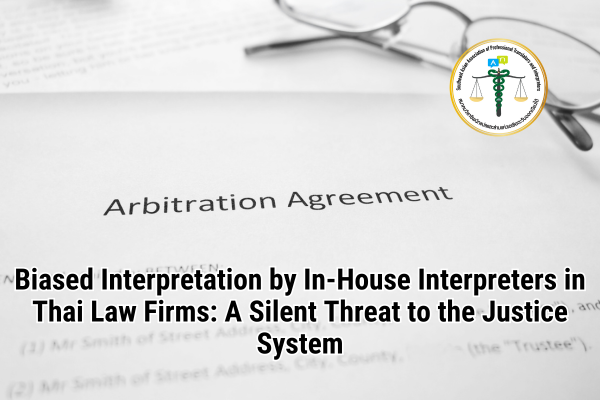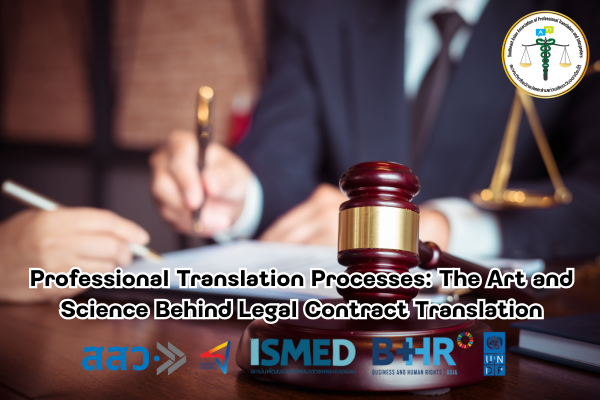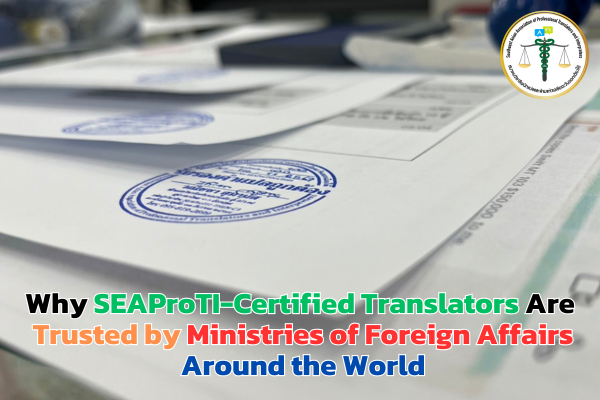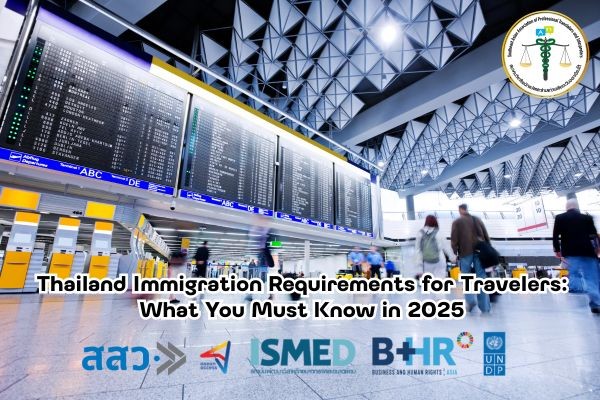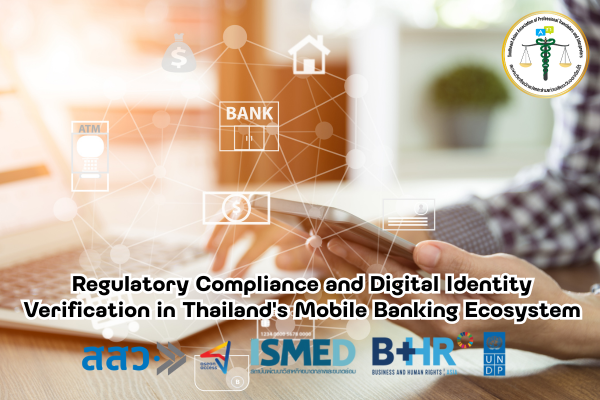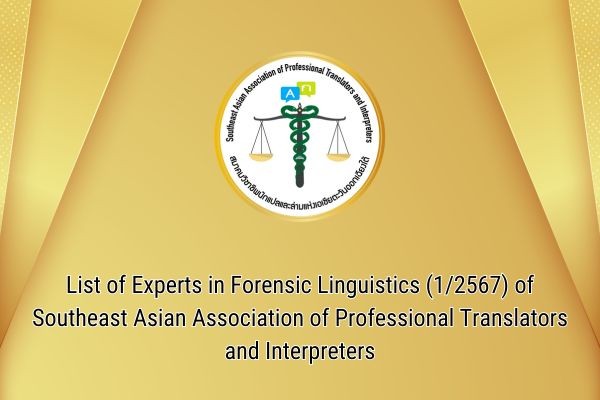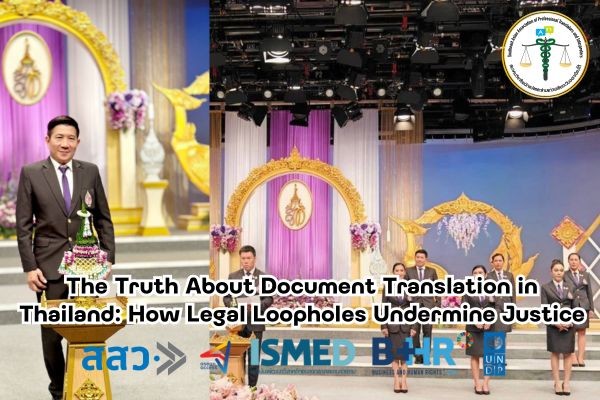Biased Interpretation by In-House Interpreters in Thai Law Firms:
A Silent Threat to the Justice System
25 February 2025, Bangkok – In Thailand’s legal system, renowned for its reliance on accuracy and fairness in adjudicating cases, effective communication stands as a cornerstone. This is particularly true in cases involving linguistic diversity. Thai courts operate primarily in the Thai language, and when witnesses or evidence involve foreign languages, interpreters become an indispensable bridge to ensure mutual understanding among all parties. However, as Thai law firms increasingly employ “in-house interpreters” who work directly for their offices, concerns about biased interpretation have emerged, posing a silent threat that could undermine the justice system over time.
The Role of Interpreters in the Justice System
In cases involving foreign parties—such as international investors litigating business contracts or expatriates facing criminal charges—accurate and impartial translation is non-negotiable. Interpreters are tasked with translating the statements of witnesses, defendants, or plaintiffs, as well as legal documents, in a manner that faithfully reflects the original meaning without additions, omissions, or distortions. In Thailand’s legal framework, where there is no jury and a single judge determines the outcome based solely on the evidence presented, the precision of translated information carries immense weight. Even a slight deviation in translation can shift a case’s outcome dramatically.
The Problem with In-House Interpreters
In-house interpreters, employed directly by law firms, differ from court-certified or independent interpreters in one critical aspect: their affiliation creates a clear risk of a “conflict of interest.” These interpreters may feel pressured—whether explicitly by their employers or implicitly through expectations—to translate in ways that favor the firm’s clients. For instance, if a witness’s testimony could harm the firm’s case, an in-house interpreter might subtly rephrase it to sound more credible. Similarly, ambiguous evidence might be translated using terms that tilt the advantage toward their side. Such actions may not stem from direct orders but from an internal incentive to please the employer—a human tendency that clashes with the impartiality interpreters are expected to uphold.
Consider a practical example: in a commercial contract dispute over delayed goods delivery, a witness might state, “We couldn’t deliver on time due to transportation issues.” An in-house interpreter could translate this as “Delivery was slightly delayed due to external factors,” softening the tone and potentially influencing the judge’s interpretation. Though seemingly minor, such distortions can significantly alter the case’s weight.
Impact on the Disadvantaged Party
This biased interpretation benefits the interpreter’s party while blatantly disadvantaging the opposing side. The party without their own interpreter, or one forced to rely on the opponent’s translation, may find their testimony or evidence presented in a way that unwittingly undermines them. The harm extends beyond losing the case—such as financial penalties or settlements—to fostering distrust in the legal system. This is especially damaging for foreign entities or investors who may already feel unfamiliar with Thailand’s legal nuances.
Consequences for Investor Confidence
Thailand is a key destination for foreign investment, spanning real estate, tourism, and manufacturing. Investors in these sectors depend on a reliable legal system to safeguard their interests fairly. If rumors or experiences of biased translations by in-house interpreters in law firms spread, it could lead investors to question the integrity of Thailand’s judicial process. This erosion of trust might prompt them to withdraw investments or shift operations to countries perceived as more transparent, such as Singapore or Malaysia, where legal systems enjoy greater international credibility.
Solution: Neutral Interpreters and Rejection of Opposing In-House Interpreters
To address this issue, a clear and actionable solution is to shift toward using neutral interpreters certified by independent bodies, such as Thailand’s Ministry of Justice or international interpreter associations. These professionals are trained in ethical standards and bound to translate faithfully, irrespective of any party’s interests. Additionally, in contentious cases, if one party insists on using their in-house interpreter, the opposing side should have the right to reject this and demand a mutually agreed-upon interpreter. Courts could further enforce this by appointing interpreters for significant cases, reducing the risk of bias.
In practice, law firms might need to relinquish some control by relying on external interpreters, but the payoff is enhanced credibility, particularly with foreign clients who prioritize transparency. While this shift may incur higher short-term costs, it preserves the reputation of both the firm and Thailand’s legal system in the long run.
Additional Proposals for Sustainability
Beyond adopting neutral interpreters, other measures could bolster the system’s integrity. These include enacting stricter regulations on the qualifications of legal interpreters, providing regular ethics training, and developing a translation review mechanism—such as recording interpretations for later verification if complaints arise. These steps would ensure translation does not become a loophole exploited for personal gain.
Conclusion
Biased interpretation by in-house interpreters in Thai law firms is not merely an individual failing but a structural challenge that could impact the credibility of Thailand’s justice system and its global image. If left unchecked, this issue could extend beyond individual cases to erode the confidence of investors and the public at large. Transitioning to neutral interpreters and rejecting those with vested interests in the opposing party is a critical first step to ensuring Thailand’s legal system remains a true pillar of justice.
SEAProTI’s certified translators, translation certification providers, and certified interpreters:
The Southeast Asian Association of Professional Translators and Interpreters (SEAProTI) has officially announced the criteria and qualifications for individuals to register as “Certified Translators,” “Translation Certification Providers,” and “Certified Interpreters” under the association’s regulations. These guidelines are detailed in Sections 9 and 10 of the Royal Thai Government Gazette, issued by the Secretariat of the Cabinet under the Office of the Prime Minister of the Kingdom of Thailand, dated July 25, 2024, Volume 141, Part 66 Ng, Page 100.
To read the full publication, visit: the Royal Thai Government Gazette
การทำล่ามโดยมีอคติของ In-House Interpreters ในสำนักงานกฎหมายไทย:
ภัยเงียบต่อกระบวนการยุติธรรม
ในระบบกฎหมายของประเทศไทย ซึ่งเป็นที่รู้จักในด้านการพึ่งพาความถูกต้องและความเป็นธรรมในการตัดสินคดี ความแม่นยำของการสื่อสารถือเป็นหัวใจสำคัญ โดยเฉพาะในกรณีที่มีความหลากหลายทางภาษาเข้ามาเกี่ยวข้อง ศาลไทยดำเนินการโดยใช้ภาษาไทยเป็นหลัก และเมื่อมีพยานหรือหลักฐานที่ใช้ภาษาต่างประเทศ ล่ามจึงกลายเป็นสะพานเชื่อมที่ขาดไม่ได้ในการถ่ายทอดข้อมูลให้ทุกฝ่ายเข้าใจตรงกัน อย่างไรก็ตาม เมื่อสำนักงานกฎหมายในประเทศไทยเริ่มใช้ “ล่ามประจำ” หรือ in-house interpreters ที่ทำงานให้กับสำนักงานของตนเอง ปัญหาความลำเอียง (bias) ในการแปลกลายเป็นประเด็นที่น่ากังวล และอาจกลายเป็นภัยเงียบที่บ่อนทำลายกระบวนการยุติธรรมได้ในระยะยาว
ความสำคัญของล่ามในกระบวนการยุติธรรม
ในคดีที่มีผู้เกี่ยวข้องจากต่างชาติ เช่น นักลงทุนต่างชาติที่ฟ้องร้องเกี่ยวกับสัญญาทางธุรกิจ หรือชาวต่างชาติที่เผชิญข้อกล่าวหาทางอาญา การแปลภาษาที่ถูกต้องและเป็นกลางเป็นสิ่งที่ไม่อาจมองข้ามได้ ล่ามมีหน้าที่แปลคำพูดของพยาน จำเลย หรือโจทก์ รวมถึงเอกสารหลักฐานต่าง ๆ ให้ตรงกับความหมายดั้งเดิม โดยไม่เพิ่มเติม ลดทอน หรือบิดเบือนเจตนา ในระบบกฎหมายไทยที่ไม่มีคณะลูกขุน และผู้พิพากษาคนเดียวเป็นผู้ชี้ขาดคดี ความถูกต้องของข้อมูลที่แปลมานั้นมีน้ำหนักมหาศาลต่อคำตัดสิน หากการแปลผิดเพี้ยนไปเพียงเล็กน้อย ผลลัพธ์อาจเปลี่ยนจากขาวเป็นดำได้ทันที
ปัญหาของล่ามประจำสำนักงานกฎหมาย
ล่ามประจำสำนักงานกฎหมาย หรือ in-house interpreters ต่างจากล่ามที่ได้รับการรับรองจากศาลหรือล่ามอิสระตรงที่พวกเขาทำงานโดยตรงภายใต้การจ้างงานของสำนักงานกฎหมาย ความสัมพันธ์นี้สร้างความเสี่ยงต่อ “ผลประโยชน์ทับซ้อน” (conflict of interest) ได้อย่างชัดเจน ล่ามเหล่านี้อาจรู้สึกกดดัน—ไม่ว่าจะโดยตรงจากนายจ้างหรือโดยนัยจากความคาดหวัง—ให้แปลคำพูดในลักษณะที่เอื้อประโยชน์ต่อลูกความของสำนักงาน เช่น หากพยานของฝ่ายตนให้การที่อาจเสียเปรียบ ล่ามอาจปรับคำพูดให้ดูน่าเชื่อถือมากขึ้น หรือหากหลักฐานบางชิ้นดูคลุมเครือ ล่ามอาจเลือกคำที่ทำให้ฝ่ายตนได้เปรียบ การกระทำเช่นนี้อาจไม่ได้เกิดจากการสั่งการตรง ๆ แต่เกิดจากแรงจูงใจภายในที่ต้องการรักษาความพึงพอใจของผู้ว่าจ้าง ซึ่งเป็นเรื่องที่เข้าใจได้ในแง่มนุษยธรรม แต่กลับขัดต่อหลักการของความเป็นกลางที่ล่ามพึงมี
ตัวอย่างที่อาจเกิดขึ้นได้จริง เช่น ในคดีสัญญาทางการค้าที่มีข้อพิพาทเกี่ยวกับการส่งมอบสินค้า หากพยานฝ่ายหนึ่งกล่าวว่า “เราไม่สามารถส่งมอบได้ทันเวลาเนื่องจากปัญหาการขนส่ง” ล่ามประจำสำนักงานอาจแปลเป็น “การส่งมอบล่าช้าเพียงเล็กน้อยจากปัจจัยภายนอก” ซึ่งทำให้ความรู้สึกของคำพูดเปลี่ยนไป และอาจส่งผลต่อการตีความของผู้พิพากษา การบิดเบือนเช่นนี้ แม้จะดูเล็กน้อย แต่สามารถเปลี่ยนน้ำหนักของคดีได้อย่างมีนัยสำคัญ
ผลกระทบต่อฝ่ายที่เสียเปรียบ
การแปลที่มีอคติเช่นนี้สร้างความได้เปรียบให้กับฝ่ายที่ล่ามสังกัดอยู่ แต่ในทางกลับกัน มันกลับกลายเป็นการกีดกันความยุติธรรมจากฝ่ายตรงข้ามอย่างโจ่งแจ้ง ฝ่ายที่ไม่มีล่ามของตนเอง หรือต้องพึ่งพาการแปลจากอีกฝ่าย อาจพบว่าคำให้การหรือหลักฐานของตนถูกนำเสนอในแง่ที่เสียเปรียบโดยไม่รู้ตัว ความเสียหายนี้ไม่เพียงจำกัดอยู่ที่ผลของคดี เช่น การแพ้คดีหรือเสียเงินชดเชย แต่ยังรวมถึงความรู้สึกไม่ไว้วางใจในระบบกฎหมาย ซึ่งอาจกระทบต่อชื่อเสียงของประเทศไทยในสายตาของนักลงทุนต่างชาติหรือผู้ที่เข้ามาทำธุรกิจ
ผลกระทบต่อความเชื่อมั่นของนักลงทุน
ประเทศไทยเป็นจุดหมายปลายทางที่สำคัญของการลงทุนจากต่างชาติ ไม่ว่าจะเป็นในภาคอสังหาริมทรัพย์ การท่องเที่ยว หรืออุตสาหกรรมการผลิต นักลงทุนเหล่านี้ต้องการความมั่นใจว่าระบบกฎหมายจะปกป้องผลประโยชน์ของพวกเขาอย่างเป็นธรรม หากข่าวลือหรือประสบการณ์เกี่ยวกับการแปลที่ลำเอียงโดยล่ามประจำสำนักงานกฎหมายแพร่กระจายออกไป อาจทำให้นักลงทุนเริ่มตั้งคำถามถึงความน่าเชื่อถือของกระบวนการยุติธรรมไทย สิ่งนี้อาจนำไปสู่การถอนการลงทุนหรือการย้ายฐานไปยังประเทศที่มีความโปร่งใสมากกว่า เช่น สิงคโปร์หรือมาเลเซีย ซึ่งมีระบบกฎหมายที่ได้รับการยอมรับในระดับสากลมากกว่า
ทางออก: ล่ามที่เป็นกลางและการปฏิเสธล่ามประจำของคู่กรณี
เพื่อแก้ไขปัญหานี้ วิธีที่ชัดเจนและปฏิบัติได้คือการหันมาใช้ล่ามที่เป็นกลาง (neutral interpreters) ซึ่งได้รับการรับรองจากหน่วยงานที่เป็นอิสระ เช่น กระทรวงยุติธรรม หรือองค์กรวิชาชีพล่ามระหว่างประเทศ ล่ามเหล่านี้ผ่านการฝึกอบรมด้านจริยธรรมและมีพันธะที่จะต้องแปลอย่างซื่อตรงต่อต้นฉบับ โดยไม่คำนึงถึงฝ่ายใดฝ่ายหนึ่ง นอกจากนี้ ในคดีที่มีข้อพิพาท หากฝ่ายหนึ่งยืนยันจะใช้ล่ามประจำของตน ฝ่ายตรงข้ามควรมีสิทธิ์ปฏิเสธและเรียกร้องให้ใช้ล่ามที่ทั้งสองฝ่ายยอมรับร่วมกัน การกำหนดให้ศาลเป็นผู้แต่งตั้งล่ามในคดีสำคัญก็เป็นอีกทางเลือกที่ช่วยลดความเสี่ยงจากอคติได้
ในทางปฏิบัติ สำนักงานกฎหมายอาจต้องยอมเสียการควบคุมบางส่วนเมื่อต้องใช้ล่ามภายนอก แต่ผลตอบแทนที่ได้คือความน่าเชื่อถือที่เพิ่มขึ้นในสายตาของลูกค้า โดยเฉพาะลูกค้าต่างชาติที่ให้ความสำคัญกับความโปร่งใส การเปลี่ยนแปลงนี้อาจมีต้นทุนสูงขึ้นในระยะสั้น แต่ในระยะยาว มันจะช่วยรักษาชื่อเสียงของสำนักงานและระบบกฎหมายไทยโดยรวม
ข้อเสนอเพิ่มเติมเพื่อความยั่งยืน
นอกเหนือจากการใช้ล่ามที่เป็นกลางแล้ว ยังมีแนวทางอื่นที่สามารถเสริมสร้างความแข็งแกร่งให้ระบบได้ เช่น การออกกฎระเบียบที่เข้มงวดเกี่ยวกับคุณสมบัติของล่ามในคดีกฎหมาย การจัดอบรมจริยธรรมให้ล่ามอย่างสม่ำเสมอ และการพัฒนาระบบตรวจสอบการแปล เช่น การบันทึกเทปคำแปลเพื่อให้สามารถตรวจสอบย้อนหลังได้หากมีข้อร้องเรียน มาตรการเหล่านี้จะช่วยให้การแปลไม่กลายเป็นช่องโหว่ที่ถูกใช้เพื่อผลประโยชน์ส่วนตัว
บทสรุป
การทำล่ามโดยมีอคติของ in-house interpreters ในสำนักงานกฎหมายไทยไม่ใช่แค่ปัญหาในระดับบุคคล แต่เป็นความท้าทายเชิงโครงสร้างที่อาจส่งผลกระทบต่อความน่าเชื่อถือของกระบวนการยุติธรรมและภาพลักษณ์ของประเทศไทยในเวทีโลก หากปล่อยให้ปัญหานี้ลุกลามต่อไปโดยไม่มีการแก้ไข ความเสียหายอาจไม่จำกัดอยู่แค่คดีใดคดีหนึ่ง แต่จะกระทบถึงความเชื่อมั่นของนักลงทุนและประชาชนทั่วไป การเปลี่ยนมาใช้ล่ามที่เป็นกลางและการปฏิเสธล่ามที่มีส่วนได้เสียกับคู่กรณีจึงเป็นก้าวแรกที่จำเป็น เพื่อให้ระบบกฎหมายไทยยังคงยืนหยัดเป็นเสาหลักของความยุติธรรมอย่างแท้จริง
เกี่ยวกับนักแปลรับรอง ผู้รับรองการแปล และล่ามรับรองของสมาคมวิชาชีพนักแปลและล่ามแห่งเอเชียตะวันออกเฉียงใต้
สมาคมวิชาชีพนักแปลและล่ามแห่งเอเชียตะวันออกเฉียงใต้ (SEAProTI) ได้ประกาศหลักเกณฑ์และคุณสมบัติผู้ที่ขึ้นทะเบียนเป็น “นักแปลรับรอง (Certified Translators) และผู้รับรองการแปล (Translation Certification Providers) และล่ามรับรอง (Certified Interpreters)” ของสมาคม หมวดที่ 9 และหมวดที่ 10 ในราชกิจจานุเบกษา ของสำนักเลขาธิการคณะรัฐมนตรี ในสำนักนายกรัฐมนตรี แห่งราชอาณาจักรไทย ลงวันที่ 25 ก.ค. 2567 เล่มที่ 141 ตอนที่ 66 ง หน้า 100 อ่านฉบับเต็มได้ที่: นักแปลรับรอง ผู้รับรองการแปล และล่ามรับรอง


